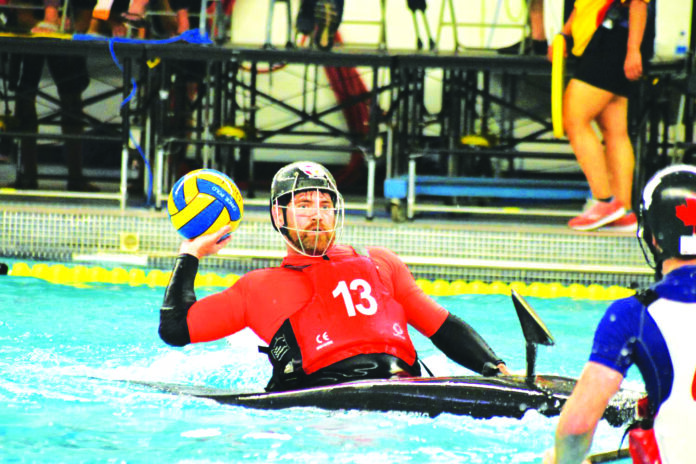
Over the years some sports have become a marriage of two different activities—think frisbee golf or chess boxing.
Boulder Creek’s own Andrew Irvine was introduced to the sport of kayak polo shortly after he completed college, and for the last 11 years, he has said “I do” to the unique sporting event which is a clash, splash and dash mixture of water polo, basketball, lacrosse and kayaking.
His affinity and love for the hybrid sport now have him competing overseas.
The 42-year-old will be playing his heart out this week at the 2022 International Canoe Federation Canoe Polo competition in Saint-Omer, France.
“This is my first and last opportunity to compete in this sport at this level. I can feel my age catching up with me,” Irvine said. “The youngest player on our team is 21 and the majority of players in the sport are in their 20s, with just a few in their 30s.”
As is the case in many sports, age is a factor in one’s ability to keep playing. Irvine is planning to hang up his helmet after this year’s competition.
Irvine was the oldest participant in the World Games in Alabama last month. He is currently the oldest member of the American team at the World Championships.
Kayak polo—also referred to as canoe polo in Europe—was first played in Pennsylvania in 1905. The modern version of the sport was unveiled at the National Canoe Exhibition in 1970.
It has since become an acclaimed sport in the World Championships, which is where Irvine is competing this week. Games are played on the pitch of a flat body of water. In the World Games, that’s an Olympic-sized swimming pool that can hold two competing teams of five players each.
In France, players will be playing in specially designed pools that are built specifically for the sport. Players are outfitted with special kayaks, paddles and helmets.
Irvine said that defending players can try to “tackle” (push over) a player of the other team if they have possession of the ball.
The specially designed paddles can be used to block passes or even pass or shoot the ball like a giant lacrosse stick. But, mostly, players use their hands to manage the ball.
The gameplay is fast-paced with continuous action during two 10-minute halves.
Irvine said that a 20-minute game doesn’t seem like much but the intensity of it is challenging.
“In the World Games, after two minutes of play, I am gassed,” Irvine said. “It is full-on sprinting the entire time.”
Videos of the sport show the intensity of hits that players take on the pitch, with canoes overturning and players trying to keep possession of a ball in the midst of an all-out paddle-based assault by their opponents.
The World Games is not as well-known as the Olympics and frequently acts as a feeder for sports to get Olympic recognition. Irvine cites his experience in Alabama earlier this year where he saw wheelchair rugby, artistic roller skating and drone flying.
The regulations and the planning of those sports are done by the World Games committee, but they are associated with the Olympic committee.
“We had about 3,500 athletes at our World Games, and the Olympics usually host around 10,000. It was really cool to be integrated with all of these athletes from around the world,” said Irvine, who mentioned there’s talk of kayak polo being taken up by the Olympics.
Irvine said he’s glad that his family supports his enthusiasm for the sport. He’s also thankful that the administration for the San Jose school he teaches at allowed him to skip the first week of class.
Irvine’s trip is being promoted by his entire school community, especially his daughters who attend the middle school at which he teaches and are excited about the games.
“For me, I’m looking forward to representing the United States on the world stage for this once-in-a-lifetime opportunity,” Irvine said.
For more information on kayak polo, and to find out where to stream the games, visit canoeicf.com.











